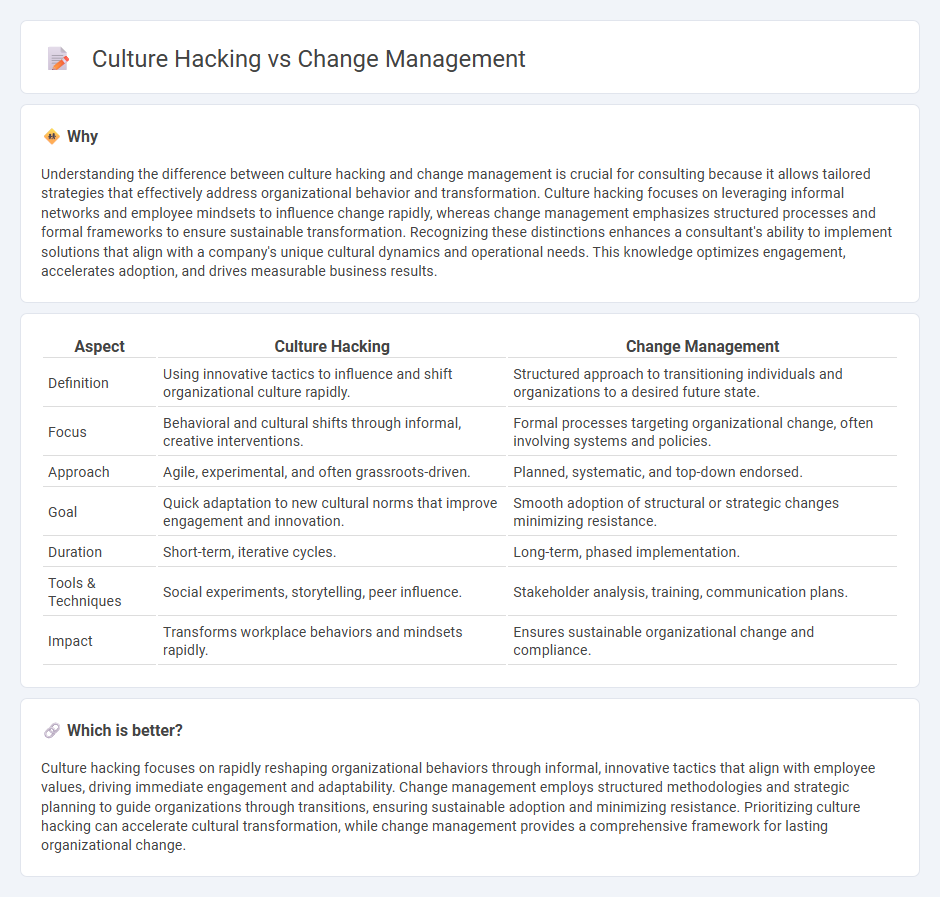
Culture hacking leverages rapid, innovative strategies to influence organizational behavior and mindset, focusing on informal networks and social dynamics to accelerate cultural change. Change management employs structured, systematic processes to guide employees through transitions, emphasizing communication, training, and leadership alignment to achieve long-term adoption. Explore how these approaches can be tailored to optimize your organization's transformation efforts.
Why it is important
Understanding the difference between culture hacking and change management is crucial for consulting because it allows tailored strategies that effectively address organizational behavior and transformation. Culture hacking focuses on leveraging informal networks and employee mindsets to influence change rapidly, whereas change management emphasizes structured processes and formal frameworks to ensure sustainable transformation. Recognizing these distinctions enhances a consultant's ability to implement solutions that align with a company's unique cultural dynamics and operational needs. This knowledge optimizes engagement, accelerates adoption, and drives measurable business results.
Comparison Table
| Aspect | Culture Hacking | Change Management |
|---|---|---|
| Definition | Using innovative tactics to influence and shift organizational culture rapidly. | Structured approach to transitioning individuals and organizations to a desired future state. |
| Focus | Behavioral and cultural shifts through informal, creative interventions. | Formal processes targeting organizational change, often involving systems and policies. |
| Approach | Agile, experimental, and often grassroots-driven. | Planned, systematic, and top-down endorsed. |
| Goal | Quick adaptation to new cultural norms that improve engagement and innovation. | Smooth adoption of structural or strategic changes minimizing resistance. |
| Duration | Short-term, iterative cycles. | Long-term, phased implementation. |
| Tools & Techniques | Social experiments, storytelling, peer influence. | Stakeholder analysis, training, communication plans. |
| Impact | Transforms workplace behaviors and mindsets rapidly. | Ensures sustainable organizational change and compliance. |
Which is better?
Culture hacking focuses on rapidly reshaping organizational behaviors through informal, innovative tactics that align with employee values, driving immediate engagement and adaptability. Change management employs structured methodologies and strategic planning to guide organizations through transitions, ensuring sustainable adoption and minimizing resistance. Prioritizing culture hacking can accelerate cultural transformation, while change management provides a comprehensive framework for lasting organizational change.
Connection
Culture hacking leverages innovative strategies to reshape organizational behaviors and mindsets rapidly, aligning closely with change management's goal of facilitating smooth transitions during transformation processes. Both practices emphasize employee engagement, adaptability, and continuous feedback loops to embed new cultural norms effectively within a company's structure. Integrating culture hacking with change management accelerates adoption rates, reduces resistance, and sustains long-term organizational growth.
Key Terms
Stakeholder Alignment
Stakeholder alignment plays a crucial role in both change management and culture hacking, as engaging key stakeholders ensures commitment and smooth transitions during organizational change. Change management emphasizes structured processes to align stakeholders with new goals, while culture hacking leverages informal networks to influence behaviors and foster shared values. Discover effective strategies to enhance stakeholder alignment and drive successful transformation.
Organizational Agility
Change management involves structured processes to guide organizations through transitions, emphasizing strategy, communication, and stakeholder engagement to maintain stability and achieve goals. Culture hacking leverages innovative and often informal tactics to shift organizational norms and behaviors rapidly, fostering adaptability and continuous improvement. Explore deeper insights on how these approaches impact organizational agility and drive sustainable performance.
Behavior Reinforcement
Change management emphasizes structured processes to guide organizational transitions, prioritizing clear communication and employee engagement for sustained behavior change. Culture hacking leverages innovative, often informal techniques to disrupt existing norms and accelerate cultural shifts, focusing on real-time behavior reinforcement through social influence and digital tools. Explore these strategies to understand how behavior reinforcement drives effective organizational transformation.
Source and External Links
What is Change Management? - IBM - Change management is the structured approach organizations use to communicate, implement, and support people and processes through transitions such as mergers, leadership changes, or new technology adoption.
What is Change Management? Definition & Process - WalkMe - Change management is a coordinated strategy for addressing the human side of organizational change through clear vision, planning, training, support, and continuous monitoring to ensure lasting adoption.
What is Change Management? Organizational, Process ... - ASQ - Change management involves defining, communicating, and planning change within all company processes while managing risks, engaging employees, and embedding new ways of working into organizational culture.
 dowidth.com
dowidth.com